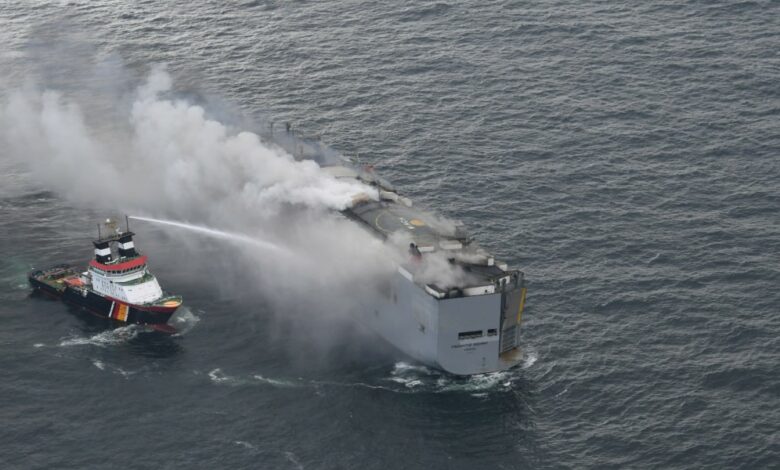Car carrier still burning near Dutch UNESCO World Heritage Site

The Dutch coastguard is trying to cool down the car carrier Fremantle Highway which has been on fire for over 24 hours.
Around midnight on July 25, the Dutch coastguard received a report that a major fire broke out on the Shoei Kisen-owned car carrier.
The vessel, chartered by Kawasaki Kisen Kaisha (K Line), was located some 27 km north of Ameland when it caught fire. According to the Dutch coastguard, one crewmember died, and several were injured while 22 were rescued by boat and helicopter.
Reports also claimed that several crewmembers were forced to jump from a height of more than 20 m to save themselves from the blaze.
Of those rescued, 16 were injured and taken by ambulance to nearby hospitals with breathing problems, burns, and broken bones. No injuries are life-threatening.
The Guardian and Nordic vessels have been on site to try and cool the sides of the ship with fire extinguishers. The Nordic was later replaced by the Fairplay 30.
Dutch salvage companies Smit and Multraship have been appointed salvors with specialists investigating the possibility of establishing a towage connection. The burning vessel is connected to the tug Hunter to keep the ship in place.
According to the coastguard, the fire onboard the Fremantle Highway cannot yet be extinguished and there is a possibility that the fire could last for days with many of the 3,000 cars onboard expected to be destroyed.
A flight ban is in effect above the area where the burning ship is located, close to an environmentally protected area. This is a temporary ban requested by the coastguard to provide room for emergency services.
The Fremantle Highway is currently near the Wadden Islands, which are part of the largest tidal flats system in the world and are a UNESCO World Heritage Site. Locals well recall the MSC Zoe box spill accident four years ago when 342 containers fell overboard, with 3,000 tonnes of cargo washing up on local coastlines.
While the coastguard claims the source of the blaze is unknown there has been widespread speculation that an electric vehicle is once again to blame.
Many boxships and car carriers have been hit by extreme fires from growing transportation of in-demand lithium-ion batteries with class, insurers, and a host of international organisations all working on solutions.
In damaged lithium-ion batteries, individual cells are prone to overheating, expelling flammable and toxic gases, and affecting surrounding cells as part of an explosive chain reaction called thermal runaway. Such batteries that catch fire can reach temperatures of more than 2,700 degrees Celsius.
The dangers of carrying lithium-ion batteries on ships were highlighted in an Allianz Global Corporate & Speciality report, which ranked fire and explosion as the number one cause of marine insurance losses by value from 2017 to 2021. The research, issued in November 2022, also revealed the growing threat of fires caused by lithium-ion batteries that are not stored, handled or transported correctly.
Calls to regulate batteries are growing, not just at sea, but on land. The British charity Electric Safety First today called on the UK government to regulate e-bike batteries like fireworks, claiming the stored energy of a fully charged e-bike battery is the equivalent of six hand grenades. Batteries on e-bikes are on average 140 times smaller than in an electric vehicle.

“in-demand lithium-ion batteries with class, insurers, and a host of international organisations all working on solutions.” How about not installing them until after carriage?
And you push the cars onboard ?
To start with this whole battery car is the biggest con of the century.
The amount of pollution in getting the raw materials fr manufacturing the batteries is horrendous plus nobody seems to worry or think about recycling the batteries after 8 – 10 yrs of use.
On top of this battery powered cars are not going to save the enviornment leave alone the planet !!
Push the cars on board sure, fr a change let the overweight stevedores do some work !!
Die Batterien halten keine 8 bis 10 Jahre, schon gar nicht bei ständigen Schnell-Ladungen ! Die Umwelt retten die Elektro Fahrzeuge natürlich nicht mehr.
Übergewichtige Stauer gibt es übrigens gar nicht mehr so viele und ein raufschieben der Autos ist Quatsch, über mehrere Decks!